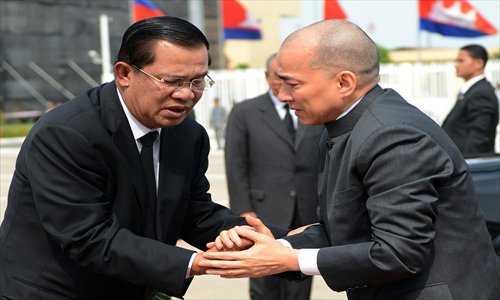China mourns Sihanouk

The Chinese government Monday mourned the death of former Cambodian King Norodom Sihanouk, who was described as "an old friend of the Chinese people" and spent his last days in Beijing, which he regarded as his second home.
Analysts say the decades-long friendship between Sihanouk and generations of Chinese leaders was a result of historical conditions, noting that such a model for diplomatic ties cannot be duplicated despite Beijing's emphasis on human interest in diplomacy.
Sihanouk died of natural causes at the age of 90 in Beijing early Monday, where he was being treated by Chinese doctors, Xinhua reported.
Cambodian King Norodom Sihamoni and Prime Minister Hun Sen arrived in Beijing on Monday afternoon to bring home the body of Sihanouk.
Chinese President Hu Jintao, Vice President Xi Jinping, Premier Wen Jiabao and former president Jiang Zemin expressed their condolences Monday over the death of Sihanouk, Xinhua reported.
Sihanouk was a great friend of the Chinese people, Hu said, adding that the China-Cambodia relationship would continue its strong growth momentum.
Sihanouk was a household name among Chinese, especially those born before the 1990s. He was greeted by crowds gathered along the streets during his visits to China, and was the main figure who came into people's minds at the mention of China's "international friend."
Nguon Serath, editor-in-chief of the Phnom Penh-based Rasmei Kampuchea newspaper, told the Global Times in an email that the former King played an important role in the relationship between Cambodia and China.
"I personally think that the policy of Cambodia on the relationship between the two countries will not be changed (following the death of Sihanouk)," said Nguon.
The legendary life of Sihanouk was closely intertwined with China.
Sihanouk paid his first visit to China in 1956, and received a warm welcome from then Chinese leaders Mao Zedong and Zhou Enlai.
The two countries established diplomatic ties in 1958.
Ji Qiufeng, a professor of international relations at Nanjing University, told the Global Times that after Cambodia severed ties with the US, China forged closer relations with Cambodia, partly out of strategic concerns.
In March 1970, while Sihanouk was out of the country traveling, the then Prime Minister Lon Nol staged a coup. Sihanouk fled to Beijing and China received him as a head of state, with Premier Zhou Enlai greeting him at the airport.
Chairman Mao Zedong gave him a residence in Beijing, and allowed him to lead the struggle against Lon Nol within China's territory.
China once again backed Sihanouk in the late 1970s during the invasion by Vietnam, which acted as a proxy of the Soviet Union, Ji said.
"The relationship between China and Cambodia shows how a big power like China won a true friend by dealing with its small neighbor with sincerity," Ji said.
Sihanouk regained the throne in 1993, and then quit in 2004 in favor of his son. The former king suffered from ill health and traveled repeatedly to Beijing for medical treatment.
In recent years, China's top leaders paid frequent visits to Sihanouk during festivals. The retired King was the only foreign guest, who stood in the first row at the Tian'anmen Rostrum watching the parade to celebrate the 60th anniversary of the founding of new China in 2009. He was also the only foreign guest sitting at the table with top Chinese leaders at National Day receptions.
Gao Fei, a professor with the Department of Diplomacy at the China Foreign Affairs University, told the Global Times that back in the 1960s, China was fairly isolated on the international stage, so China and its people attached great value to its ties with Sihanouk.
"It was also a result of the late Premier Zhou's diplomatic skills, which were emotional," said Gao. "However, it was hard to duplicate the model of China-Cambodia ties, though China's diplomacy has always placed great value on human interests."
Ma Zhengang, former Chinese ambassador to the UK, shared similar sentiments over Chinese leaders' efforts to forge strong personal ties with foreign leaders.
"However, such ties may have to give way to national interests," said Ma, adding that the fact that most foreign leaders only serve several years in office makes it harder for a duplication of the special ties between China and Cambodia.
Agencies contributed to this story